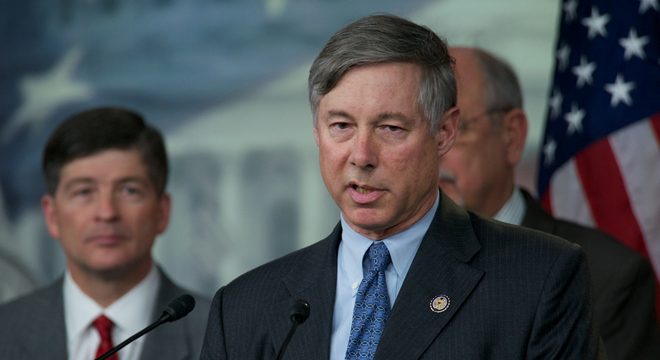Rep. Darrell Issa in recent days has moved on from bashing the Obama administration’s support for the failed solar-company Solyndra to training his sights on another federal loan guarantee — $730 million for the U.S. subsidiary of a Russian steel company.
During an interview on Fox News Thursday, Issa said the loan for Severstal North America, which is based in Dearborn, Mich. “never should have passed the sniff test.”
“We’d like to have a reversal on the commitment,” Issa said of the $730 million Severstal loan. “…One of the great scandals here is, remember, this is just making steel, and as a matter of fact, the type of steel for which there’s an excess in the market. But more importantly, the jobs that are being, quote, created here are being moved from other plants. So this is an example, no jobs created, not green energy, not necessary to make this happen, and not a U.S. investor. So on every possible count, the American people care about, this loan never should have passed the sniff test.”
Issa also sent out a release Thursday with this screaming headline: “Issa Questions Sec. Chu About $700 Million Loan Offer to Severstal, Company Owned by Russian Oligarch Worth $18 Bilion.”
Before going there, Issa may have wanted to check in with his GOP colleague from Michigan, Rep. Fred Upton, the chairman of the Energy and Commerce Committee and the Republican leading the charge against the Obama administration loan-guarantee program for clean-energy companies.
Upton just last year was among the Michigan lawmakers who wrote to Energy Secretary Steven Chu calling for “prompt completion and consideration of loan applications” from Michigan companies, including GM, Chrysler — and Severstal.
Since the Solyndra story broke and Upton started hammering the White House over it, other news outlets have noted Upton’s support for a loan guarantee programs aimed at helping companies developing renewable energy, as well as nuclear and coal.
In 2007, Upton supported a measure that created the Advanced Technology Vehicle Manufacturing (ATVM) Loan Program, targeting manufacturers and suppliers looking to retool U.S. factories to build high-fuel economy vehicles, USA Today reported in late September.
Severstal was a huge beneficiary of the program — winning the $730 million loan in July of this year after Upton signed the Michigan delegation letter to Chu.
“For America’s auto industry to continue its global leadership into the 21st Century, we must foster the American manufacture of fuel-efficient vehicles for the mass market,” the July 1, 2010, letter stated.
A year later, when the Energy Department announced the Severstal loan, Chu estimated it would significantly increase the supply of cutting-edge, light-weight, high-strength steel and create 2,500 construction jobs and more than 260 permanent manufacturing jobs in the process.
“An increased supply for this breakthrough technology steel will help U.S. automotive manufacturers meet the pending and future design, weight, and safety requirements of advanced technology vehicles,” Chu said in a release.
But Issa has gone after the company for being based overseas and run by a steel tycoon. Severstal North America, located in Michigan, is a subsidiary of the Russian steel and mining company, OAO Severstal, led by Alexei Mordashov, one of the world’s wealthiest businessmen, with a personal net worth over $18 billion.
In a press release Thursday, Issa noted that he raised the Severstal issue with Chu because it appeared there was no immediate need for this private firm to require federal financing, nor was it clear that the type of steel was even eligible for federal loan consideration under the Advanced Technology Vehicle Manufacturing Program (ATVM) overseen by the Department of Energy.
In March 2011, before receiving taxpayer funds, Severstal had already sold plants in Ohio, West Virginia, and Maryland in order to shift financial resources to its Dearborn facility, Issa noted. Following these closings, Severstal announced a $740 million modernization project at the facility.
“Surprisingly, in June 2011, the DOE granted an ATVM loan to Severstal, months after the decision to undertake the Dearborn project had already been made,” Issa wrote in his letter to Chu, asking for documents and information by 5 p.m. Nov. 3.
“Announcements made by Severstal during the loan consideration process indicated that the company had ample means to carry out the project,” Issa wrote. “Given the immense wealth and power of Severstal’s CEO and the fact that the corporation had already made significant investments in the project, it is surprising that DOE would choose Severstal for a loan meant to spark new businesses and technologies within the automotive industry.”
DOE spokesman Damien LaVera defended the loan guarantee for Severstral in a news release Wednesday.
“While it is important to note that the due diligence on the project is continuing, this project has received bipartisan support because producing the next generation of automotive advanced high-strength steel is vital to helping American workers remain competitive,” LaVera said.
A spokeswoman for Severstal told The Detroit News the company went through a rigorous, two-year application process.
“The next-generation advanced high-strength steel technology we are putting in place with this project is … critical for advanced-technology vehicle manufacturers to meet the future fuel-efficiency goals,” spokeswoman Katya Pruett said.






